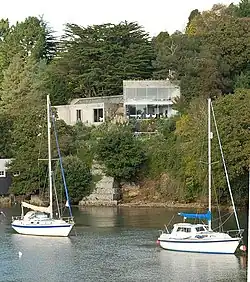Wendy Foster
Wendy Ann Foster (née Cheesman; 1937 – 15 January 1989)[1][3] was a British architect and co-founder of Team 4 and Foster Associates.
Wendy Cheesman Foster | |
|---|---|
 | |
| Born | Wendy Ann Cheesman 1937[1] |
| Died | 15 January 1989 (aged 51)[2][3] |
| Nationality | British |
| Alma mater | Yale School of Architecture |
| Occupation | Architect |
| Spouse(s) | Norman Foster (m. 1964) |
| Children | 4 sons[4] |
| Practice | Team 4 (1963–67) Foster Associates (1967–1989) |
| Buildings | Creek Vean (Team 4), Sainsbury Centre for Visual Arts, Willis Faber and Dumas building, HSBC Building in Hong Kong (Foster Associates) |
Career

Team 4 was an architectural firm, established in 1963 by architecture graduates Su Rogers (née Brumwell), Wendy Cheesman, Norman Foster and Richard Rogers.[5][6] The firm originally included Wendy Cheesman's sister, Georgie Wolton, who, as the only qualified architect of the group, allowed the practice to function. Georgie Cheesman left after only a few months, leaving the remaining members to try to pass their professional exams while continuing to practice.[5]
The notable buildings that she worked on while at Team 4, includes the first ever house to win a RIBA award - Creek Vean house, Feock, Cornwall, England (1966), Reliance Controls factory, Swindon (1967), Jaffe House (also known as Skybreak House), which was Humphrey Spender's house, Maldon, Essex (1965-1966) and Wates Housing, Coulsdon, Surrey (1965), all in England.[7]
By June 1967, Foster and Rogers, had both decided to dissolve the firm.[8][9] The Rogerses (Richard and Su) established Richard and Su Rogers Architects and the Fosters (Norman Foster and Wendy Foster, née Cheesman)[6] established Foster Associates.[6] The notable buildings that Wendy Foster was involved in include Sainsbury Centre for Visual Arts, Willis Faber and Dumas building, and the HSBC Building in Hong Kong.
Private life
Wendy Cheesman married Norman Foster in 1964.[10][6] She died of cancer in 1989, aged 51, when she was still a partner/director at Foster Associates.[4][3]
See also
References
- "Index entry". FreeBMD. ONS. Retrieved 10 September 2017.
- "Norman Foster: Man of steel". The Independent. 8 September 2006. Retrieved 2017-09-10.
- "Foster Associates Ltd: Directors Report and Financial Statements for the year ended 30 April 1989". Companies House. Retrieved 2017-09-10.
- "Foster's brew". Telegraph Media Group. Archived from the original on February 26, 2016. Retrieved 10 September 2017.
- Ian Lambot (Ed.), "Norman Foster: Buildings and Projects Volume 1 1964-1973", Watermark Publications (1991), ISBN 1-873200-01-3. Chapter 1 "Team 4" by Sir Richard Rogers, pp. 14-15
- "The Guardian Profile: Sir Norman Foster: The master builder". The Guardian. 2 January 1999. Retrieved 2017-09-10.
- Hall, Jane (Writer on architecture) (16 October 2019). Breaking ground : architecture by women. London. p. 69. ISBN 978-0-7148-7927-7. OCLC 1099690151.
{{cite book}}: CS1 maint: location missing publisher (link) - "El talento es importante, pero lo es más la constancia y el esfuerzo". Gonzalo Carazo. 9 December 2012. Retrieved 2017-09-06.
- "Richard Rogers, Architect (1933-), From the House to the City". Design Museum. Retrieved 2009-10-04.
- "Reaching for the sky". The Independent. 5 October 1996. Retrieved 10 September 2017.